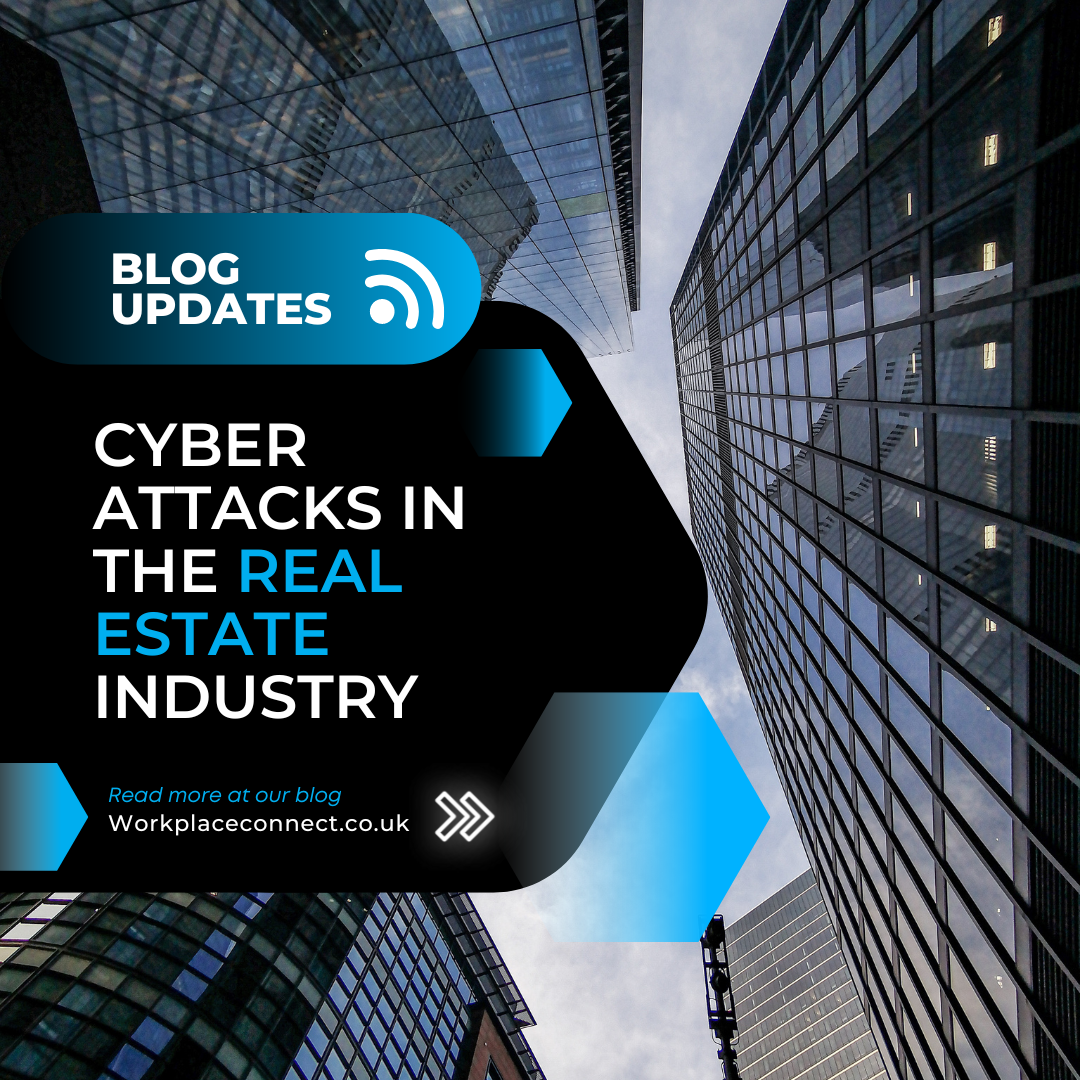The word “cyber security” is typically related to data breaches, such as when hackers get access to bank accounts, viruses lock up computers, or nation-state conflicts occur.
But it’s quickly turning into a subject that investors and real estate agents must be knowledgeable with.
More and more internet-accessible devices are being incorporated into modern buildings to control occupant safety, accessibility, and thermal comfort. These are all meant to improve sustainability performance and streamline the tenant experience. The ability to access these systems from a central location and their shared network architecture means that more and more applications and data are handled online and kept on cloud computing servers.
Why is the Real Estate Industry Targeted by Attackers?
Real estate agents are entrusted with a wealth of personal and financial information from buyers and sellers of real estate. Such sensitive information can be exploited and lead to a severe loss for the person impacted if it ends up in the wrong hands. These occurrences also damage a company’s brand reputation. Therefore, it is the duty of real estate agencies to implement appropriate cybersecurity measures to protect the information of both their clients and their own company.
Real estate agency businesses have become easy targets for fraudsters as their work procedures and payment systems become more computerized. The fact that these gamers frequently engage in high-value financial transactions puts them on hackers’ radars.
The cyberattacks that target the real estate sector are not targeted at a particular area or stakeholder. Criminals are now using a wider range of tactics to deceive real estate agents, buyers, and sellers, including but not limited to:
- Theft of financial information and personal information
- Theft of private company data, such as property records and deal specifics
- Selling property while using phony paperwork in order to defraud buyers of their money
- Ransomware, which locks down victims’ access to their data in order to demand payment
- Taking control of a company’s or person’s website and publishing false or embarrassing material to defame the company or person
Because these organizations frequently forget to put in place appropriate security on their equipment and data, fraudsters target a lot of real estate agents (and eventually their clients). The majority of the data they keep is freely shared between individuals and remains vulnerable to hacking.
Tools and Strategies Used to Attack the Real Estate Industry
Hackers employ a variety of techniques and devices to defraud real estate agencies and the organizations that work with them, from malware, viruses, and phishing to complex social engineering schemes. Malicious software that has been placed on a device without the user’s knowledge or agreement is the most frequent tool. It could come in the form of tracking cookies, Trojan horses, spyware, adware, keyloggers, or other corrupted files.
Business email compromise (BEC), often known as email spoofing, is another trick frequently employed to trick participants in a real estate transaction. It entails sending an email from a phony account that appears to be official correspondence from a real company email ID. To send harmful attachments, links to hacked landing pages, or just to persuade users to provide their personal data and make payments, cybercriminals fake email accounts.
Pharming is also another threat to the real estate industry’s interests. It involves creating a fake version of an authentic company website and deceiving consumers into accessing it. Using this technique, scammers can steal user IDs and passwords from victims and use them on legitimate websites for their own purposes. Similar tactics like phishing are used to steal private information from websites and emails that have been spoofed. In addition to desktop computers, cell phones and tablets are also often used in the real estate industry, making them potential targets for hackers.
Cost of Cyberattacks on Real Estate Companies
Never undervalue the effects that could result from a data breach. A cyberattack can have expensive and wide-ranging effects, including but not exclusive to:
- Loss of data, including information on customers, projects, or the company’s finances
- Payroll and employee data systems that have been compromised
- The shutdown of a server or system
- Intellectual property theft
- Lawsuits resulting from the failure to protect particular data types
- Cost of bringing systems back online
- Paid ransom to hacking gangs
- Regulator costs and/or sanctions
- Damage to reputation
- Unplanned downtime
An attack has effects that go far beyond what happened at the time. A well-executed cyberattack could even have the potential to bankrupt smaller real estate firms. In actuality, 60% of small companies that experience a cyber attack fail within six months.
Cybersecurity Measures to Protect the Interests of your Real Estate Company and its Clients
Only 50% of real estate organizations are sufficiently prepared to thwart or mitigate a cyber assault, according to a KPMG report. A company’s vulnerability to hackers and fraudsters increases as it becomes less prepared.
Here are some essential ways to safeguard your company:
Email Security
The most frequent means of introducing risks into your digital environment are emails, and Email Security is an easy solution to stop all of them. The solution protects accounts set up on local, in-house servers as well as those supported by Microsoft Exchange, Office 365, and other well-known platforms.
You can safeguard your communication against a variety of dangers and stop unauthorized parties from obtaining sensitive corporate data thanks to the special capabilities of Email Security. Additionally, spam emails are removed automatically by it.
Users are safeguarded by email security against sophisticated threats including spear phishing, whaling, typo domain, and spoofing assaults.
Endpoint Security
Endpoint devices are essential for data sharing in distant working environments. These include computers, laptops, tablets, smartphones, printers, and scanners. Endpoint devices are connected to your company network over the internet. Endpoint Security shields connected devices against malware and phishing/pharming efforts by watching over their endpoints. It adds specialized web filtering, email filtering, antivirus, and firewall features to protect personal devices and local area networks from online threats.
You may safely manage your company’s data and prevent any loss or downtime brought on by faulty operating systems.
Multifactor Authentication
Traditional password protection strategies for client and property listing databases grow ineffective as cyber threats get more sophisticated. To access private accounts, hackers use spear-phishing, pharming, and even simple relaying or spraying attacks. Multifactor authentication can be used to stop these situations (MFA).
After logging in with your login credentials, Workplace Connect enables unfailing MFA with zero-trust security to add additional protection layers to your accounts. Even if someone manages to crack the password of an authorized user, it prevents all harmful attempts to access sensitive data.
With our MFA, you may implement customized cybersecurity policies for the company while selecting your own authentication techniques. It is affordable for long-term use and easily expandable.
Virtual Firewall
A firewall is a well-known cybersecurity solution that many small and medium-sized businesses utilize. Despite paying a charge for the service, utilizing it at a basic level prevents you from using numerous features and puts your devices in danger.
On the other hand, enabling a firewall to its fullest extent may interfere with regular operations because some apps may perceive even secure files and web URLs as malicious.
Workplace Connect provides a virtual firewall to prevent these problems and quicken the reaction to threats. It keeps you informed of emerging dangers while continuously defending your network and devices.
Web Security
Every day, your organization connects to the internet, so you need to make sure that even if you accidentally click on a dangerous link, your equipment and data are safe. In a world of malicious apps and remotely managed programs, free antivirus software may not always provide sufficient security.
Web Security from Workplace Connect can help in this situation since it eliminates online dangers before they reach the endpoints of your network. The solution analyzes numerous URLs, web requests, and linked files to determine their intent. Depending on how safe or hostile they are, it immediately permits, blocks, or redirects them for closer inspection.
By using our Web Security, you can also monitor the online behavior of your remote employees and make sure that their work-related gadgets are secure. The solution allows you to control your IT security rules in real-time, generates extensive analytical reports, and works with any operating system.
Make the Smart Choice
As a real estate expert, you assist your clients with investing wisely and relocating to secure communities. The importance of purchasing a well-balanced set of cybersecurity solutions cannot be overstated if you want to keep your own digital community secure and resistant to evolving online dangers.
Get in touch with us right away if you’d like to learn more about safeguarding your IT assets and preventing inadvertent data leaks.







